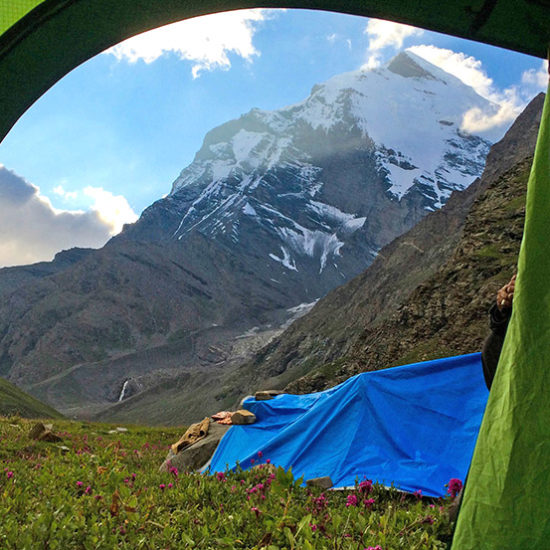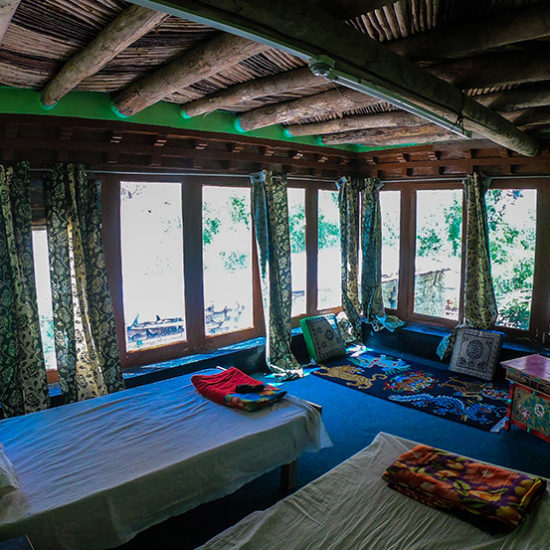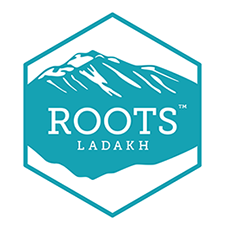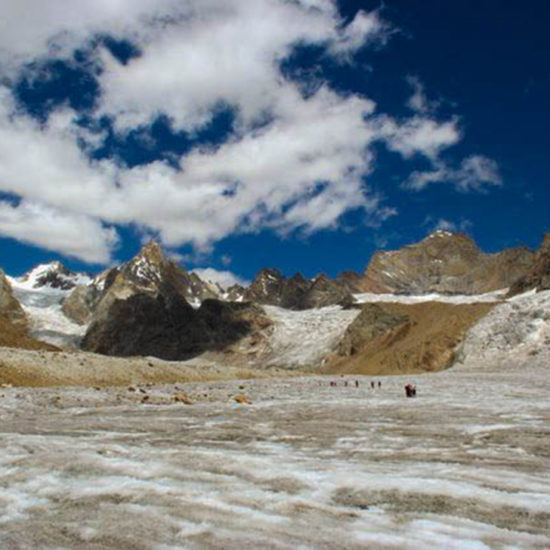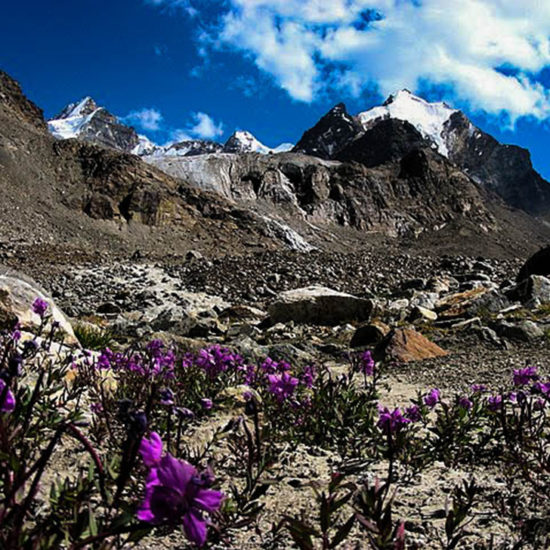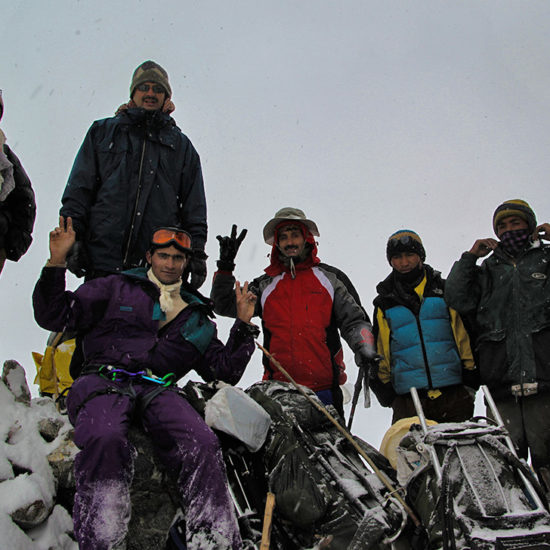Omasi La Trek
The Omasi La or Umasi La is one of the most extreme trekking expeditions in the Zanskar range which also has a lot of history and legend attached to it.
Famously known as the “Saphire Trek” in the 1980s, this is an ancient Trans Himalayan trade route between Zanskar and Kistwar famous for its Saphire mines in Paddar valley, a remote Buddhist settlement in the Kishtwar mountains. This is same route used by the Dogra General Zorawar Singh during his attempts to invade Ladakh in 1800s. Although there is only one high pass on this trail, it is a very challenging and treacherous one due to the extreme weather conditions and the presence of many deep crevases while ascending and desceding a total of 14 km glacier section. The expedition team will require knowledge of ice craft and an experienced guide. However, the transition from the Higher Himalayas into the Lower Himalayas is truly a surreal experience. This route also provides a rare peak into the life and culture of the many tribes and settlements dwelling in these mountains on both sides of the pass. Truly and outback odyssey
-
Tour StartsSrinagar/Leh
-
Tour EndsJammu
-
Style of TourTrekking (6 days)
-
Max Altitude5314m
-
Approx Trekking80 Kms
-
Trek DifficultyHard
-
Best SeasonJune to September
-
StaysHotels on twin sharing basis/Organized Camping
-
MealsBreakfast and dinner in Hotels, All meals on Treks
Day 1 :Arrive in Srinagar/Leh and Drive to Kargil (2600m)
- Pick up from Airport and drive to Kargil (5 hours)
- Lunch Enroute
- Your trek leader will greet you at the hotel upon arrival.
- Evening for leisure
- We will drive to Hundurman which is border settlement on the LoC between India and Pakistan and check out the Hundurman Museum
- Explore a local family run museum (www.kargilmuseum.org) followed by walk in the old caravan bazaar; a rare glimpse into Kargil’s Silk Route trade history.
- Overnight in Kargil
Day 2 :- Drive from Kargil to Padum (3670m)
- After an early breakfast, we will drive towards Padum through the scenic Suru valley
- Enroute visit the 7th Century Buddha rock statue at Kartse Khar
- Enjoy a hot cup of Tea near Parkachik glacier and Lunch in Rangdum
- Stop by at the 200 year old Rangdum monastery
- Enjoy the views of Rta Tso Lhang Tso twin lakes at Penzi La top (4400m) and Drang Drung glacier
- Arrive in Padum by evening
- Overnight at hotel
Day 3: Acclimatisation day at Padum
- Take this day to get acclimatised to the high altitude.
- After breakfast, visit Karsha monastery and the Zangla fort ruins.
- Post lunch take a short hike to staqringmo just above Padum town
- Evening for leisure
- Overnight at hotel in Padum
Day 4: Drive from Padum to Zongkul (3859m) Trek from Zongkul to Doksa (3670m)
- After breakfast at the hotel, drive from Padum to Zongkul monastery for 36 kms
- Dzongkul is an ancient cave monastery attributed to Naropa who was a Buddhist yogi (956-1041 CE). It is said that Naropa had meditated in one of the two caves. It is definitely worth a visit before we begin our trek.
- From here we will begin our trek after loading up our equipment on the local porters
- Today will be a short distance and an easy trail along the river stream
- We will arrive by lunch time and setup camp at Doksa for the night
Day 5: Trek from Doksa to Pullo/Base Camp (4482m)
- We will continue our upstream trek towards the Omasila base camp near the Haptal glacier
- The trail is a gradual ascent after crossing a rock bridge
- We will set up by the stream close to the terminal moriane of the glacier
- Take the rest of the day to prepare yourself mentally and physically for the ascent next day
Day 6: Trek from Pullo to Ruwa Camp (4537m) via Omasi La (5314m)
- Today is the hardest and the most rewarding day of the trek. We need to carry a good amount of packed lunch for the day.
- We will be starting very early after a healthy breakfast
- Ascend starts by approaching tiring extensive boulders and moraines on a wide glacial valley for the first couple of hours followed by a steep and challenging ascent till the top of the pass
- From the top, the descend towards Kishtwar is again very steep and along a glacier
- It involves trekking on snow fields and negotiating a number of crevasses along the glacier which is why ice craft becomes indespensible during the descent.
- The trail emerges near a rock shelter known as Ruwa, a small portion of dry land surrounded by glaciers.
- We will halt here for the night. If weather conditions don’t permit we will have desend further down another 12 kms.
Day 7:Trek from Ruwa Camp to Kach Pansar (3981m)
- Today the trek involves crossing yet another glacier and then a long and tiring traverse through boulder fields and moraines.
- We will start early after a healthy breakfast
- Trail starts with a kilometer long steep descent from the campsite onto the glacier
- A 3 kilometer traverse on the glacier will bring you to a boulder field which is about 2 kms long
- From here on, it is an easy descent till Kach Pansar
- You will be able to see breathtaking views of the the tree line and meadows of Paddar valley
- We will camp here for the night, just above the tree line.
Trek from Kach Pansar to Machail (2792m) via Suncham (3187m)
- The last two days of the trek, we will be covering more distance but it’s an easy descend all the way down.
- Today we will be desending into the tree line from Kach Pansar to Machail which is the headquarters of Paddar valley
- The first section of the trail from Kachpansar to Bhujas starts with a steep descent through long meadows and then onto the Bhujas plains lined with birch trees gorwing along side the valley
- We will stop here to have our packed lunch
- As you enter the tree line you will be able see a wide variety of wild birds including creepers, finches and raptors
- Another few kilometers through the valley and we will arrive at Suncham village which is the first settlement after crossing Omasi La
- In Suncham the famous Saphire mines are situated at a distance of 3 kms hike in the opposite direction
- The trail ahead from Suncham to Machail is through thick forest of Fir, Pine, Spruce, Deodar, Wilows and Paper Brush trees along with a variety of herbal plants.
- Also known as the Bot (Buddhist in Kashmiri language) Nala, there are many Buddhist settlements along the opposite end of the trail such as
- Losani, Daga and Dangali. There are two monasteries as well in Losani and Haloti
- We will arrive at the campsite at Machail by evening and set up camp here for the night amidst the lush greenery
- You could visit the famous Chandi Mata Temple in Machail in the evening.
Day 9:Trek from Machail to Massu (1983m)
- Today is the last day of our trek and we will again be covering a long distance
- But this trail will be a mix of walking along a foot trail as well as along a dirt road (which has been constructed recently)
- However, vehicular movement on this section of the road is not frequent
- Trail till Massu is mostly gradual descent with breathtaking scenary through lush green forests and interesting villages
- There are plenty of beautiful camping locations in Massu where we can setup camp for the night
- Celebrate your success with the team in the evening!
Day 10:- Drive from Massu-Gulabgarh-Kishtwar to Jammu
- After an early breakfast today, we will load up the gear onto our jeep and say goodbye to the support staff and porters
- We will begin the journey from Massu to Jammu via Batote
- Arrive in Jammu by evening and check into hotel
Day 11:- Departure from Jammu
- Early morning transfer to the airport
- INCLUSIONS
- EXCLUSIONS
- ADDITIONAL INFO
- Airport pick up and drop
- Journey to Kargil from Srinagar/Leh and Kargil to Padum
- Journey from Gulabgarh/Massu to Jammu
- Trek point transfers
- Transport for sightseeing in Padum
- Breakfast and dinner at hotel in Kargil, Padum and Jammu
- All meals on the trek
- Twin sharing rooms at hotel in Leh
- Dome tents on trek
- Camping gear (sleeping bags, mattress, two man dome tents, toilet tent, dining tent)
- Safety gear (rope, ice axe, harness etc)
- Onsite first aid
- Oxygen cylinder
- Trained and experienced guide/trek leader
- Kitchen and support staff
- Porters
- Trekking permits(if any)
- Camping charges
- Single room accommodation
- Lunch during stay in hotels
- Personal equipment such as walking sticks, rain coats, gloves etc
- International & Domestic flight fares, visa charges
- Monument/monastery and Museum visit fee
- Any expenses of personal nature such as mineral water, laundry.
- Cost incurred due to emergency evacuation
- Any kind of insurance, such as accident, theft, medical, evacuation etc.
- Personal Mules & porters. You can request for one in advance while booking
- Tips to porters, camping team, driver, guide, etc.
- Cost incurred due to change / extension in the itinerary due to roadblocks, bad weather condition, flight delays, vehicle breakdowns, etc.
- We have a zero trash tolerance policy. We always clean up after ourselves on all hikes and trips
- We use portable T3 tents and portable toilets and wash basins at our campsite which are cleared and wrapped up at the end of each journey.
- Our camp locations are temporary and we don’t keep any permanent fixtures at the location. We say no to plastics
- Be Local – there is no harm learning at few local words while you are there. It always helps in building a rapport with the locals and blend in. Try to eat and buy locally. Carry your own water bottles.
- We use comfortable mattresses with -10degree sleeping bags
- There is no electricity at most of our campsites as they are at remote locations. We use solar powered tent lamps.
- Our trips require a moderate level of fitness.
- The maximum altitude for treks can go upto 6100m
- Drink lot of water to stay hydrated and to avoid mountain sickness
- We always carry a first aid kid and a portable oxygen canisters for emergencies
- Average of two guides are provided for a group of 10 people
- We respect the local traditions and customs. We will always brief you regarding these each time you travel to a different location. We encourage you to be open and free while travelling to these locations and invite you to explore the region in its true sense.
- We focus on engaging local communities in our work to create livelihoods locally. Most of our camps/homestays are managed by the local villagers and local youth is engaged as guides/hosts
- We organize workshops to train local communities and youth for technical training in mountain guiding, hospitality and responsible tourism. If you are interested in contributing, do let us know.
- Valid ID proof (Passport/Voter ID/Drivers Licence)
- No suitcases. Opt for 70 to 90 litre backpacks
- Water-proof trekking shoes
- One down jacket or warmer for chilly nights
- Rain poncho or jacket/windcheater (a must!)
- Thermal inner (not advisable to wear it while trekking)
- Trekking pants (one spare)
- Sun block
- Hat
- Sun goggles
- Trekking pole
- Spare under garments and socks (three pairs max)
- Flashlight with extra batteries (preferably wearable)
- Water bottle, preferably wide mouthed, with at least one litre capacity
- Personal toiletries,/li>
- Power bank (if you want to use phone camera)
- That book you’ve been meaning to read
- You are expected to carry your own luggage. If you need a porter/mule during treks please inform us in advance.
- Delays are expected on account of roadblock & weather conditions. Our effort will be to continue with the trip as per the schedule & make you as comfortable as possible. But in such situations we may have to compromise on the campsite & adjust to these situations then & there. The final call will be taken by our Lead Guide on location.
- The itinerary should be viewed as ideal & we may have to make some spot changes due various unavoidable reasons.
- The distances & altitude mentioned in the above itinerary are to the best of our knowledge & information; marginal variance in the actual distances & altitudes is possible.
- You are expected to be in reasonable shape and fitness, being able to walk for several hours at a normal pace as well as to take care of your own equipment.
- You are required to produce a Medical Fitness certificate before starting the trip.
- The minimum age restriction for this trip is 18
- All outdoor related activities involve a certain level of risk. You are expected to sign an Indemnity Form in agreement to the risks involved through part taking in such outdoor activities.
- Roots Ladakh reserves the right and permission to use photographs of individuals and photographs submitted by them on tour for use in promotional and publicity purposes

